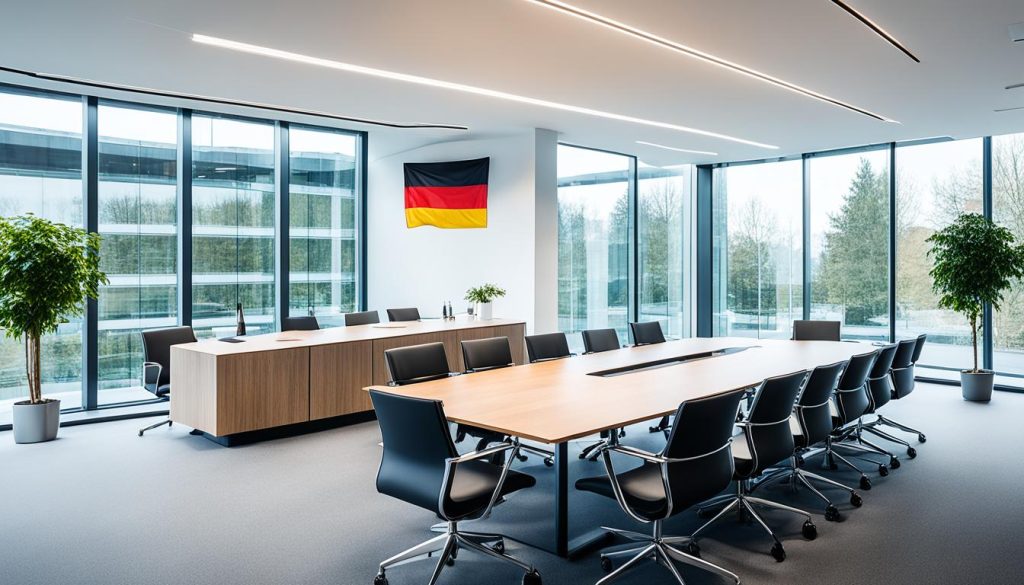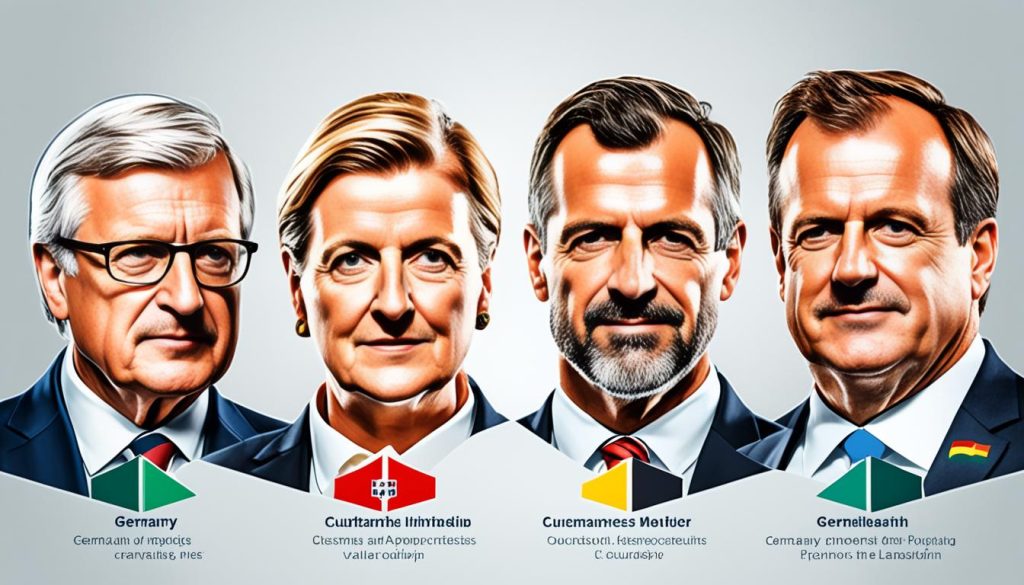An in-depth understanding of cultural differences is key in international trade. Learning about Germany’s business practices, the equality in Nordic corporate culture, and Portugal’s mix of new and old in economic customs gives valuable regional insights. This knowledge helps businesses work well in these varied areas.
Knowing about these areas helps companies build global relationships. They can make their plans fit well and match with local business manners. Our article will explain these business cultures. This makes it easier for companies to work across cultures successfully.
Understanding Cultural Nuances in International Business
Cultural awareness is key in achieving global business success. Understanding cultural differences helps in effective international cooperation. As businesses go global, they meet various cultures. Correctly dealing with these can improve business relations and boost international trade.
For international success, companies must understand different cultural factors. These include communication styles and management approaches. For example, some cultures value straight talk while others prefer subtlety to keep harmony. Acknowledging these differences makes for a diverse and successful workplace.
- Assessing the essential role of cultural awareness in crafting a global corporate identity that respects and integrates local customs.
- Exploring strategies that promote international cooperation through culturally informed practices, enhancing team dynamics and project outcomes.
- Discussing the impact of cultural sensitivity on navigating the global business environment, from market entry to sustainable growth.
- Analysing the subtleties of cultural variations and their effects on consumer behaviour, employee satisfaction, and negotiation tactics.
- Highlighting successful case studies of business relations matured through adaptable and culturally informed approaches.
Investing in cultural knowledge is essential as companies expand internationally. It gives them a competitive edge, ensures they follow local customs, and builds mutual respect. This respect is vital for long-lasting international relationships.
Core Cultural Values Influencing German Business Etiquette
In international trade, Germany is highly valued for its organisational principles. Its punctuality is central to business manners and shows the nation’s strong work ethic. For those entering the German market, it’s essential to grasp these values.
Importance of Punctuality
German punctuality can surprise foreign partners. Schedules are detailed and followed closely because being on time shows you’re reliable and professional. Time is as important as money in Germany. Wasting it is a big no-no in business terms. Not being punctual can ruin reputations and damage business opportunities. It suggests a person might not be serious about working together.
Adherence to Hierarchical Structures
German companies follow a strict hierarchy. This may seem unflexible, but it makes decision-making clearer and more efficient. Positions in the hierarchy dictate responsibilities and how communication flows. Everyone knows their duties and their power, keeping expectations clear and resolving conflicts smoothly.
German business culture values punctuality and a clear hierarchy highly. They’re key to its efficient and respected economy. While foreign partners might find these practices challenging, adapting shows a willingness to work well together.
Distinguishing Traits of Nordic Business Practices
Understanding business cultures in Nordic countries means getting to grips with their unique decision-making styles. Each nation has its special way of doing things. This mirrors their societal values and ethics in business.
Consensus-Driven Decision Making in Sweden
In Sweden, businesses heavily rely on team agreement. Their approach to decisions is through Swedish consensus. Here, everyone’s input matters, leading to well-supported business moves. Meetings may take time as all aim for unity, crafting widely backed strategies.
Individualism and Quick Solutions in Norway
In contrast, Norway leans towards individual action in business. This leads to quick deciding and speedy adjustments to challenges. Their knack for ad-hoc solutions brings about clever, fast outcomes. It shows Norwegian pride in swift adaptation and creativity.
Knowing these distinct styles is key for those engaging with Nordic businesses. The Swedish method may seem slow to Norwegians. Conversely, Norwegians’ speed can surprise those from Sweden. Yet, both ways highlight the Nordic flair for innovation, reliability, and progress in business.
Portugal’s Business Culture: A Blend of Tradition and Adaptability
The corporate scene in Portugal is a unique cultural mix. It builds on the Portuguese business traditions and blends in the flexibility of Portuguese adaptability. This mix is key when looking at business operations in Portugal. It shows us the special way the country approaches economic behaviour in Portugal.
In Portugal, businesses value the traditional ways of working. They respect those with experience and follow established rules. At the same time, they are keen to try new things. This helps them stay ahead in the global market. So, the business culture in Portugal balances its unique traits with a willingness to change.
- Commitment to historical business methods with contemporary applications
- Respect for hierarchical relationships merged with modern leadership styles
- Preservation of face-to-face meetings in an increasingly digital world
- Openness to international partnerships and cross-border collaborations
But this balance is not easy to achieve. Companies often have to find the middle ground between their cultural heritage and new opportunities. Yet, this blend of old and new shows the Portuguese skill in valuing their past while looking to the future.
The Portuguese business world is a great example of tradition and innovation working together. For those wanting to do business in Portugal, it’s crucial to understand this balance. It shows how Portugal honours its history while embracing change and innovation.
Compare Business and Culture Between Germany, Nordic Countries, and Portugal
The discussion on business in Germany, Nordic areas, and Portugal reveals different economic habits. Looking at their cultures, we see varied approaches to trade. Every region shows unique cultural and business styles.
Germany values time and a clear hierarchy. This reflects their love for order. German companies focus on careful planning. They ensure everyone knows their role, aiming for high efficiency. Meanwhile, in Nordic countries like Sweden and Norway, things are more equal. They value everyone’s input, showing a culture of togetherness.
In Portugal, ancient traditions meet new ideas. Companies blend old customs with new ways of thinking. They welcome innovation, mixing respect for tradition with modern visions.
We note a few key differences:
- Decision-making contrasts among them. German firms follow strict rules, Nordics prefer agreement, and Portugal is flexible yet planned.
- On management, Germany is more hierarchical. Nordic culture is relaxed and equal. Portugal combines respect with adaptability.
- In terms of office behaviour, Germany expects timeliness and formality. The Nordics embrace teamwork, and Portugal offers a mix of old-fashioned politeness with new efficiency.
This mix of values and practices offers rich opportunities. It invites investors and entrepreneurs to understand and appreciate these differences.
Communication Styles: High-Context vs. Low-Context Variations
In today’s world, understanding global communication is key. The difference between high-context and low-context communication is vital. It affects both personal interactions and international business.
Non-Verbal Cues and Context in High-Context Cultures
High-context communication is rich with implied meanings. Non-verbal cues play a major role here. In such cultures, the situation around the dialogue matters as much as the words.
This reliance on the unspoken makes for a nuanced way of expressing. It leaves a lot open to interpretation.
- The role of silence as a communicative tool.
- The importance of gestures and facial expressions in conveying emotions.
- How cultural backgrounds inform the reading of implicit messages.
Bluntness and Directness in Low-Context Cultures
On the other hand, low-context dialogue focuses on clarity and being straightforward. Cultures that value direct talks like clear, explicit information. They take things as they are, without looking for hidden meanings.
- A brief explanation of why direct communication can enhance efficiency.
- An exploration of the potential challenges in cross-cultural collaborations.
- Examples of how cultural communication styles manifest in business settings.
Being able to tell and adjust to these different communication styles is crucial for global success. Recognising these distinctions helps avoid misunderstandings. It also builds deeper mutual respect in cross-cultural dealings.
Work-Life Balance: Perspectives from Different Cultures
Exploring work-life balance through different cultural perspectives shows a variety of views and practices. These differences affect how employees worldwide balance their jobs and personal lives. Each country tries to find a balance in its own way. Yet, the methods and results can vary greatly based on culture and economy.
-
In the Nordic countries, job satisfaction and life integration are key. They offer great employment benefits like long parental leave and lots of holiday time. They believe a happy worker is a productive one. This shows how much they value happiness at work and home.
-
This is different in places where such benefits are less common or valued. Here, work-life balance is seen differently. The focus may be more on economic success than on the happiness of each worker.
Looking at cultural perspectives and policies helps us see the values in international work environments. This understanding helps global companies meet the needs of their diverse employees.
-
It’s important to see how employee happiness is linked to productivity.
-
Understanding local employment laws is key to balancing work and life.
-
We must see how policies help keep employees happy and committed.
Risk Aversion and Innovation in Business Strategy
How risk aversion affects innovation shapes business strategies across the world. German firms take calculated risks. They make sure each strategic step is thoroughly planned. Meanwhile, Portuguese entrepreneurship is changing the business scene with its passion for new ideas and growth.
The Calculated Decisions of Germany and Nordic Countries
Germany and Nordic countries are very cautious. They carefully weigh potential outcomes before trying new ideas. Their risk aversion leads to stability and long-term success. But, it might slow down quick innovation.
- Thorough risk analysis before adopting innovative solutions.
- Strategic planning as a foundation for business operations.
- Focus on incremental innovation within the confines of existing systems and structures.
Portugal’s Growing Openness to Entrepreneurship
Portugal is now more open to entrepreneurship. The country’s business strategy now sees risk-taking as a way to spark creativity and economic growth. This change is seen in the booming startup scene and increased investment in innovation.
- Evidence of a societal shift towards valuing and encouraging entrepreneurship.
- Growing support mechanisms for startups, including funding and mentorship programmes.
- Ambitious projects and companies disrupting traditional markets.
The way these regions view risk differs, but they agree on one thing. Balancing caution and innovation is crucial. Whether it’s German calculated risks or Portuguese entrepreneurship, successful business strategy requires blending both to deal with global market complexities.
Leadership and Management Philosophies Across Borders
Looking into different leadership philosophies shows us a world of approaches. Each is shaped by its culture’s values and history. Some leaders use power and rule strongly, showing an autocratic style. Others, however, promote teamwork and value everyone’s input. This shows an intercultural leadership approach that focuses on including everyone.
Not all management strategies work everywhere. They change based on where they’re used. Some international leadership styles might keep old power structures. Others might change how things are done. This has a big effect on how a group works and how happy workers are.
When managing across countries, it’s important for leaders to understand different intercultural leadership differences. Knowing this helps create a place where all ideas are welcomed. This is key for solving global issues creatively and bringing in new ideas.
- Autocratic Leadership: This is when leaders make all the big decisions themselves. It’s very top-down.
- Egalitarian Leadership: This style has few levels of control. It encourages working together and being open.
- Transformational Leadership: Here, leaders motivate their teams. They push for change and help workers grow by setting clear goals.
- Situational Leadership: Leaders change their approach based on what the team needs or what the situation calls for.
How well an organisation moves between these philosophical differences shows how good its management strategies are. Being flexible with leadership styles helps leaders connect with diverse teams. This leads to better work and more innovation.
To wrap up, as companies grow internationally, mixing different leadership philosophies becomes crucial. Understanding cross-border management is key to having a unified, flexible, and effective global team.
The Role of Traditions and Customs in Business Interactions
In the world of international business, knowing and using business traditions and workplace customs is crucial. It helps you communicate and work together better. For example, the Nordic countries have a casual approach, while Germany values strict order. Each shows how culture shapes business.
Nordic Unconventional Approach to Workplace Hierarchy
Cultural norms in Nordic countries show they like a different kind of work structure. They focus on clear communication and have less strict ranks. This makes it easier to talk to bosses and work together. It’s a key part of their business way and sets them apart from others.
Preserving Professional Formalities in Germany
Germany, however, sticks to a formal work setting. They have clear job roles, making their work culture very structured. This helps them do business in an orderly way. It shows how much they value keeping things organized at work.
Traditions and customs play a big role in a company’s culture. From the Nordic focus on equality to German formality, these practices shape how businesses run. Understanding these differences is vital for success in the global market.
Negotiation Tactics and the Art of Agreement
Being good at making deals is about more than tactics. It’s about knowing how different cultures negotiate. Businesses try to make agreements worldwide, noticing the Nordic and German ways. Both have their unique styles in making agreements.
Consensus vs. Individualistic Approach in the Nordics
In the Nordic countries, working together is key. Their approach puts everyone’s ideas together for a final decision. This makes the agreement richer but might take longer.
The Structured Negotiation Process in Germany
In Germany, negotiations are precise and organized. They follow a clear, structured process. Understanding these styles is vital for international deals.
Mastering these negotiation styles requires flexibility and cultural knowledge. It’s crucial for making successful deals and building lasting partnerships globally.
Challenges and Benefits of Diverse Workforces
Today, workforce diversity is a big topic among global businesses. It brings both cultural challenges and many benefits in a professional setting. Working with people from different cultures shows us how complex global teams can be. It needs a careful way of managing and working together.
One big issue companies face is misunderstandings due to different ways of communicating. Yet, these challenges are balanced by the benefits of a diverse workforce. Bringing together various cultural backgrounds leads to new ideas and views. This is key for innovation in our fast-moving world.
Further, diversity helps build better connections with a wide range of customers. It makes a company’s message stronger and wider. Using unique insights from a diverse team improves customer relationships. It meets more needs and likes of different people.
- Enhanced Problem-Solving: Diverse teams offer many solutions to hard problems. They use their varied experiences.
- Improved Decision Making: Having a diverse workforce means many viewpoints are looked at. This leads to fairer and more inclusive choices.
- Greater Innovation: Different backgrounds boost creativity and innovation. They help companies stand out by coming up with new things.
To enjoy these benefits, companies must take steps to value diversity. They should train in diversity, support leaders who include everyone, and push for open talks. These actions help reduce cultural clashes and use the full potential of a diverse team. By doing so, businesses can see all the good that diversity brings.
Operational Efficiencies: Punctuality and Time Management
The way we manage time and stick to schedules greatly affects our success. In Europe, different countries view time management in unique ways. For instance, Germany and Portugal show us two different styles.
Germany’s Strict Adherence to Schedules
In Germany, being on time is a strict rule. It shows their deep commitment to schedules. This approach enhances efficiency, builds reliability, and improves workflow.
German punctuality is key in their business world. It boosts their international reputation for being dependable.
Flexible Timing in Portugal’s Business Encounters
In Portugal, however, there’s more flexibility. They adjust to situations on the go. This adaptability is central to their business culture.
- Adapting to real-time situations to maintain continuity.
- Utilising a more personable approach to foster professional bonds.
- Accommodating unforeseen changes with minimal business disruption.
This flexibility in Portugal doesn’t reduce their effectiveness. Instead, it highlights how being adaptable contributes to efficiency.
To work well across countries, understanding these differences is key. Balancing Germany’s strict timing with Portugal’s flexibility aids in successful cross-cultural work. It brings out the best in both approaches for everyone’s benefit.
Conclusion
When we look closely at our study, we see that understanding business cultures in Germany, Nordic countries, and Portugal is key. Germany’s strict timing, Sweden’s team decisions, and Portugal’s blend of old and new shape global business. This knowledge helps grow international trade by understanding different ways of working.
The global market is connected, making it important to understand these cultures. Their approaches, from planning to negotiating, affect daily work and big plans. By using these insights, businesses can do better. They can build strong international ties.
Different business manners and cultures show us how to be flexible. For those in international trade, this study is like a guide. It helps them work better worldwide. By valuing different cultures, businesses can gain an edge in international trade.
















